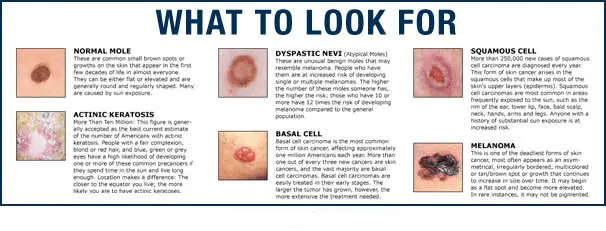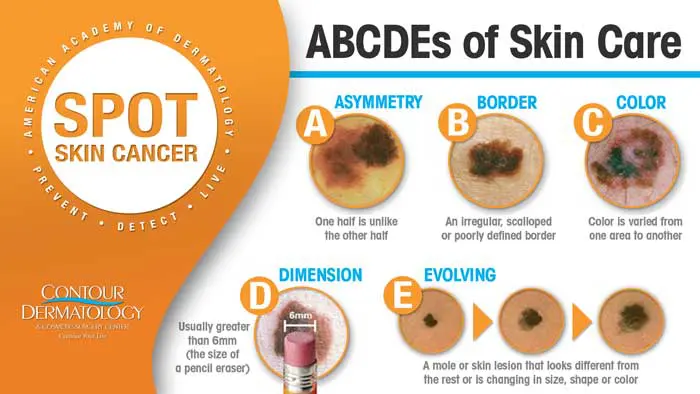Skin Cancer
According to the Skin Cancer Foundation, one in five Americans will develop skin cancer by the age of 70. This statistic emphasizes the importance of wearing broad-spectrum sunscreens and taking additional precautions when spending a lot of time outdoors.
At Contour Dermatology and Cosmetic Surgery Center, we have extensive knowledge of identifying and diagnosing skin cancers. We are passionate about educating individuals on how to perform regular self-examinations and encourage patients to schedule a yearly dermatologist visit.
Skin Cancer
According to the Skin Cancer Foundation, one in five Americans will develop skin cancer by the age of 70. This statistic emphasizes the importance of wearing broad-spectrum sunscreens and taking additional precautions when spending a lot of time outdoors.
At Contour Dermatology and Cosmetic Surgery Center, we have extensive knowledge of identifying and diagnosing skin cancers. We are passionate about educating individuals on how to perform regular self-examinations and encourage patients to schedule a yearly dermatologist visit.
Types of Skin Cancer
The three major types of skin cancer have differing characteristics. Here’s what to look out for:
Basal cell carcinoma (BCC)
BCC is the most common type of skin cancer, starting in the basal cells — the lowest part of the skin’s outer layer. This type of skin cancer often looks like a waxy bump or a flat, flesh-colored lesion. It mostly develops on sun-exposed areas, such as the face, ears, neck or back, and rarely spreads to other parts of the body.
Squamous cell carcinoma (SCC)
SCC begins in the squamous cells, which are the flat cells found in the upper layer of the skin. Like BCC, SCC develops from exposure to ultraviolet (UV) radiation from the sun or tanning beds. It will look like a firm red bump, a scaly patch, a sore that doesn’t heal or a wart-like growth that may crust and bleed. Look out for SCCs in similar areas to BCCs.
Melanoma
Melanoma is the most serious type of skin cancer. Starting in cells called melanocytes, this cancer can spread to other parts of the body if not caught and treated early. Check for melanoma as either a new spot or a change in an existing mole. Key characteristics of these cells include an asymmetrical border, a change in color or a diameter the size of a pencil eraser.
How to Spot Skin Cancer
Skin cancer most often develops on skin exposed to the sun. To stay on top of your wellness, perform a full-body skin exam monthly in a well-lit room, using a full-length mirror. Check all areas, including your scalp, between your toes and even the soles of your feet.
The best advice is to schedule a regular total body skin check with Contour Dermatology and Cosmetic Surgery Center. We look for suspicious changes in your skin and detect skin cancer at its earliest stages. Dr. Timothy Jochen and the Contour Dermatology and Cosmetic Surgery Center team take time to listen to your needs and provide for the best care. Early detection is the greatest defense and makes for a successful skin cancer treatment.
Treatment for Skin Cancer at Contour Dermatology and Cosmetic Surgery Center
Several treatments exist to eliminate skin cancer cells before they spread to other areas of the body. Contour Dermatology and Cosmetic Surgery Center is your trusted skin cancer doctor and can provide the following solutions for our patients:
Cryosurgery is a treatment that uses extreme cold, typically from liquid nitrogen, to destroy abnormal tissue, including cancer cells. It’s often used for early-stage skin cancers and precancerous lesions.
Curettage and electrodesiccation scrapes away the cancerous area with a curette, followed by the application of an electric current to destroy any remaining cancer cells. This is commonly used for small basal and squamous cell carcinomas.
Excisional surgery surgically removes cancerous tissue, along with a margin of healthy skin to ensure complete elimination of cancer cells.
IGSRT uses low levels of X-ray energy over the treatment area to create ultrasound images for proper diagnosis. Your provider uses these images to target the area with precise treatment dose, sparing the surrounding healthy tissue.
Immunotherapy enhances the body’s immune system to fight cancer cells. This can be administered topically or systemically, depending on the cancer’s characteristics.
The MOHS technique removes skin cancer layer by layer, examining each sample under a microscope until no cancer cells remain. This method preserves as much healthy tissue as possible.
Topical chemotherapy involves applying anti-cancer medications directly to the skin in the form of creams or lotions. This is typically used for cancers confined to the top layer of the skin.
PDT is a treatment that combines a photosensitizing drug with a specific type of light to destroy cancer cells. It’s often used for superficial skin cancers.
Dr. Timothy Jochen speaks with Jenifer Daniels of CBS Local 2 about Skin Cancer
Contact Us to Schedule Your Consultation Today
Contour Dermatology and Cosmetic Surgery Center is proud to serve communities around California, including Rancho Mirage, La Quinta, Palm Springs and Loma Linda. Contact us to schedule a skin cancer exam near you today.


















